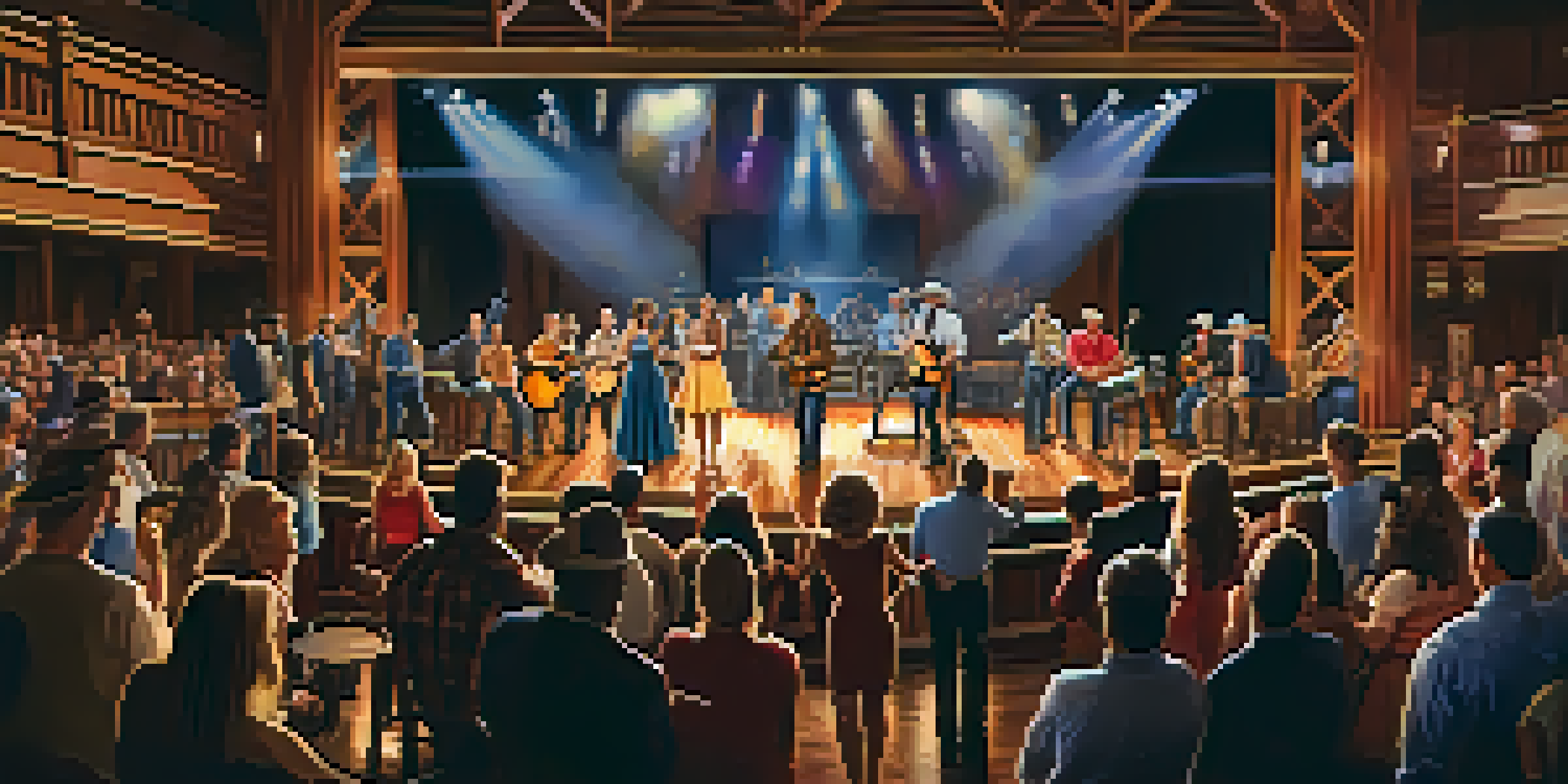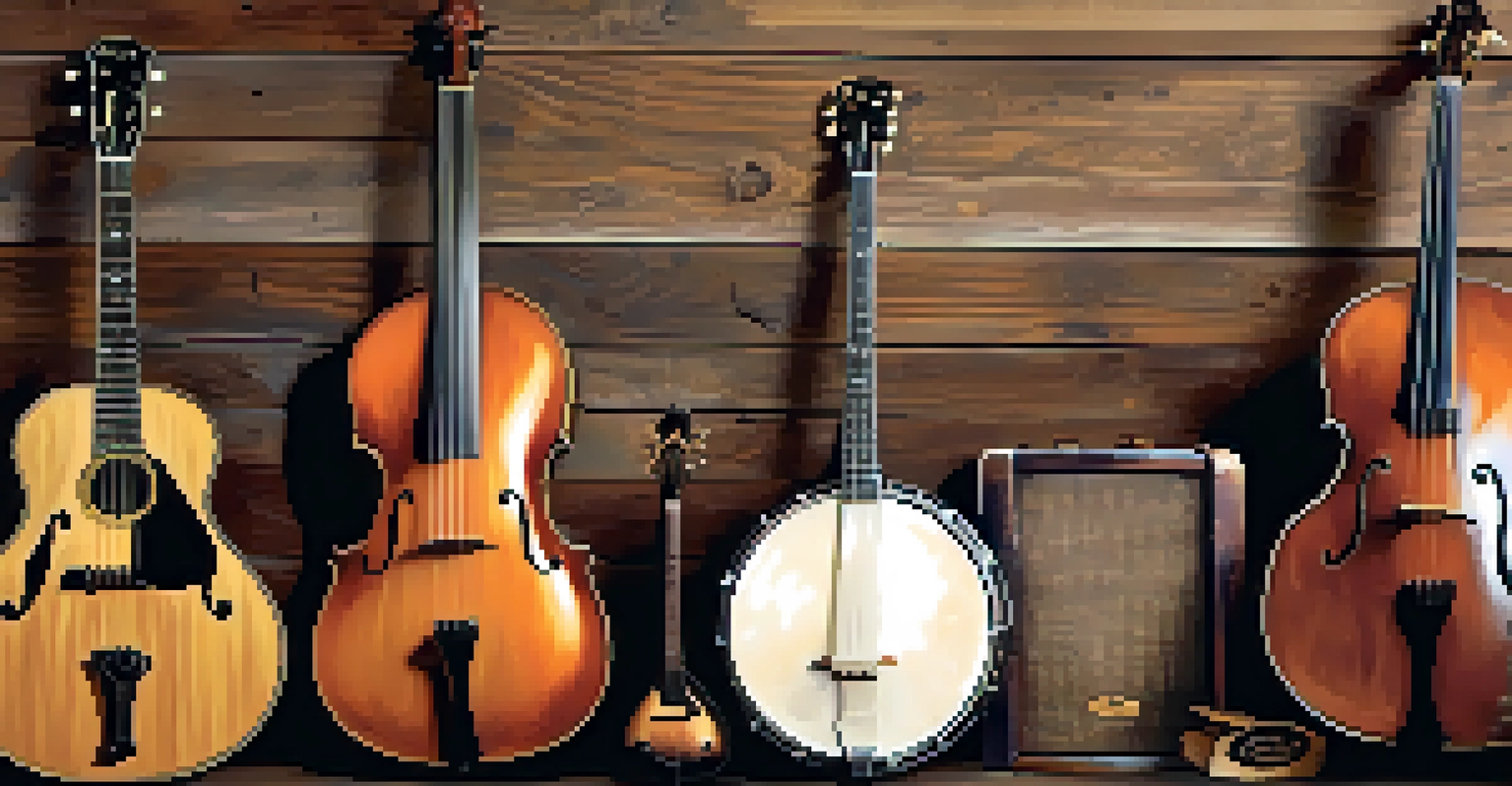The Evolution of Country Music: Nashville's Role Explained

Origins of Country Music: A Melodic Beginnings
Country music traces its roots back to the early 20th century, emerging from a blend of folk, blues, and traditional music styles. The sounds of rural Appalachia, with its heartfelt storytelling and simple melodies, laid the groundwork for what would become a beloved genre. Artists like Jimmie Rodgers and the Carter Family were pioneers, infusing their music with personal narratives and cultural experiences.
Country music is about stories and emotions, and it resonates with people because it is real and relatable.
As these early artists recorded their songs, they helped to crystallize the essence of country music. The instrumentation, often featuring guitars, fiddles, and banjos, became signature elements that defined the genre. This fusion of different musical influences created a sound that resonated with many, particularly in the Southern United States.
Nashville, often dubbed 'Music City,' began to emerge as a central hub for country music in the 1920s. With its growing recording industry, Nashville provided a platform for these early country artists, allowing their music to reach a wider audience and setting the stage for future evolution.
The Birth of the Grand Ole Opry: A Cultural Milestone
In 1925, the Grand Ole Opry was established, marking a pivotal moment for country music's national recognition. This weekly radio program showcased both established stars and up-and-coming talent, creating a melting pot of musical styles and personalities. The Opry became a beloved institution, drawing fans from all over who were eager to experience live performances.

The Opry's emphasis on live shows helped cultivate a unique connection between artists and their audiences, fostering a sense of community and shared culture. Many country legends, from Hank Williams to Dolly Parton, graced its stage, solidifying their place in music history. The Grand Ole Opry's influence extended beyond Nashville, helping to shape the image of country music across the country.
Country Music's Rich Origins
Country music emerged from a blend of folk, blues, and traditional styles, shaped by artists who infused personal narratives into their melodies.
As the Opry gained popularity, it also attracted the attention of record labels and producers, further propelling Nashville's role in the music industry. This created a feedback loop where the city became synonymous with country music, and artists flocked to Nashville to record and perform, leading to an explosion of talent.
The Nashville Sound: A New Era of Country Music
In the 1950s and 1960s, the 'Nashville Sound' emerged, characterized by smooth vocals and lush arrangements. Artists like Patsy Cline and Jim Reeves brought a polished sensibility to country music, appealing to a broader audience that included pop and rock fans. This transition marked a significant shift from the raw, traditional sound to a more refined version.
I think the best songs come out of the best stories. You can't just write a song about a truck. You have to write about life.
Producers such as Owen Bradley played a crucial role in this evolution, incorporating strings and background vocals to create a more radio-friendly sound. This innovative approach helped country music cross over into mainstream pop culture, leading to a surge in popularity. The Nashville Sound also paved the way for future artists to experiment with their music, blending genres and styles.
While some purists criticized this shift, it was essential for the genre’s growth. This new sound opened doors for diverse artists and led to the creation of sub-genres, including country-pop and country-rock, which further diversified Nashville's musical landscape.
Outlaw Country: A Rebellion Against the Norm
In response to the polished Nashville Sound, the 1970s saw the rise of 'Outlaw Country,' a movement characterized by a raw, authentic approach to music. Artists like Willie Nelson and Waylon Jennings rejected the industry standards, opting for a more personal and unfiltered expression. This rebellion resonated with fans who craved authenticity in a commercialized music landscape.
Outlaw Country often incorporated elements of rock and folk, resulting in a sound that appealed to a younger demographic. This shift also encouraged a storytelling approach that highlighted real-life experiences, struggles, and emotions, making the music relatable. The movement challenged the status quo, leading to a newfound appreciation for artists who stayed true to their roots.
The Rise of Diversity in Country
Recent years have seen a broader range of voices in country music, with artists challenging norms and embracing diverse experiences and sounds.
Nashville's reaction to Outlaw Country was mixed; some embraced it, while others viewed it as a threat to the traditional sound. Nevertheless, this movement significantly impacted the city’s music scene, as it prompted a reevaluation of what country music could be, encouraging more artists to explore their unique styles.
The 1990s: A Commercial Boom for Country Music
The 1990s marked a commercial boom for country music, with artists like Garth Brooks and Shania Twain achieving unprecedented success. This era saw country music crossing over into the pop charts, with catchy melodies and relatable lyrics drawing in a diverse audience. Nashville became a bustling center of activity, with record sales skyrocketing and new artists emerging regularly.
Music videos played a significant role during this time, with networks like CMT and GAC providing a platform for artists to showcase their work visually. This visual storytelling helped elevate the genre's appeal, making it more accessible to fans who may not have previously engaged with country music. The combination of catchy hooks and engaging visuals created a recipe for success.
As the genre grew, so did the influence of Nashville's music industry. Major labels invested heavily in country artists, leading to polished productions and a focus on marketability. While this brought newfound fame to many, it also sparked discussions about the authenticity of country music and the balance between artistic integrity and commercial success.
The Rise of New Voices: Diversity in Country Music
In recent years, the landscape of country music has expanded to include a wider array of voices and perspectives. Artists like Kacey Musgraves and Lil Nas X have challenged traditional norms, bringing fresh sounds and ideas to the forefront. This evolution reflects a broader cultural shift, as the genre becomes more inclusive and representative of diverse experiences.
Nashville has played a crucial role in this transformation, with songwriters and producers actively seeking to amplify underrepresented voices. This shift has led to collaborations across genres, blending country with hip-hop, pop, and R&B, creating innovative sounds that resonate with younger audiences. It’s a burgeoning era that embraces experimentation and authenticity.
Nashville's Ongoing Influence
Nashville continues to play a pivotal role in the evolution of country music, adapting to cultural shifts and technological advancements to remain relevant.
The focus on diversity also means exploring themes that go beyond the typical country narrative. From discussions on mental health to LGBTQ+ representation, new artists are broadening the conversation within the genre. Nashville's willingness to adapt and grow ensures that country music remains relevant and continues to evolve in exciting ways.
The Future of Country Music: What Lies Ahead?
As we look toward the future, the evolution of country music shows no signs of slowing down. Nashville remains at the heart of this transformation, continually adapting to changing tastes and cultural influences. The rise of technology and social media has also empowered artists to share their music directly with fans, bypassing traditional channels.
Emerging platforms like TikTok have introduced a new generation of listeners to country music, allowing for viral hits that redefine what success looks like. This democratization of music distribution means that artists from diverse backgrounds can break into the industry, creating a more vibrant and varied musical landscape. The future of country music is bright and full of potential.

As new voices and sounds emerge, Nashville will likely continue to be a vital player in shaping the direction of country music. The genre's ability to adapt and evolve while staying true to its roots ensures its enduring appeal, making it an exciting time for both artists and fans alike.